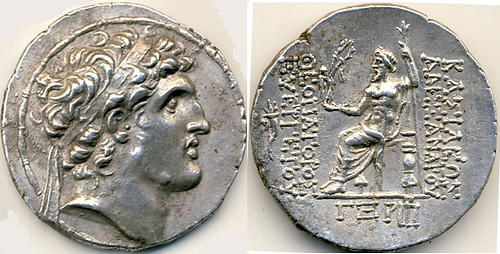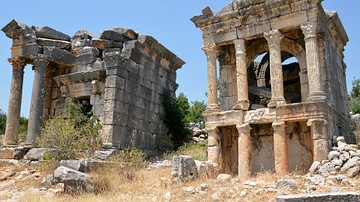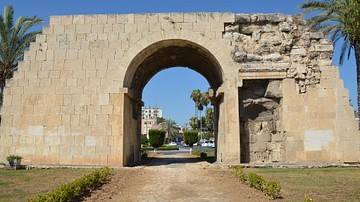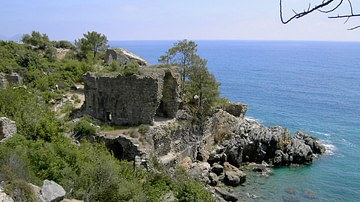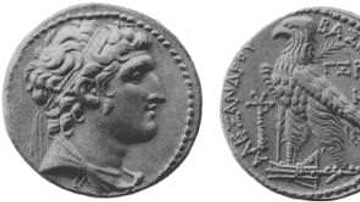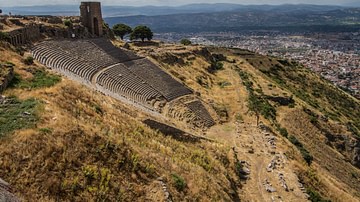Alexandros I Balas was a Seleucid king from 152 BC to 145 BCE. As the Seleucid king Demetrius I Soter (162-150 BCE) became more and more unpopular due to his arrogance and drunkenness, it was quite an easy task for the rival kingdoms, such as Pergamum or Egypt to stir up a revolt against him. As a competitor was lacking, two youngsters were found, a boy and a girl who were presumed to be the children of Antiochus IV Epiphanes, the uncle of Demetrius. The boy was presented to the Roman Senate as the legitimate heir of the Seleucid kingdom. The Senate gave a senatus consultum authorizing the new heir to claim his kingdom (Polybius, XXXIII, 18, 6-14) - but did nothing more to strengthen this claim.
Alexander - for it was him - landed at Ptolemais-Ake, on the Phoenician coast. He was helped and supported by Attalus II, the king of Pergamum, and Ariarathes IV, the king of Cappadocia. But the strongest help came from the king of Egypt, Ptolemy VI Philometor. Not only did he offer military support, but also the hand of his daughter, Cleopatra Thea. Alexander did his best to win the support of the Jewish rebels and march on to Antioch. The final battle between him and Demetrius I apparently took place around June or July 150 BCE, according to a cuneiform tablet.
After he became the uncontested ruler of Syria (to some modern authors, this would be the moment Ptolemy VI became fully involved in his support and the royal wedding was celebrated), Alexander went on living an easy life, full of pleasure, perhaps neglecting his royal duties. The date of the loss of Mesopotamia to the Arsakids, rulers of Parthia, could be placed between 155 BCE and 140 BCE (it is a very debated issue for the modern historians). It is however almost certain that Media was lost c. 148 BC, and the king of Elymais, Kamnaskires, took Susa around 147 BCE.
In 147 BCE, Demetrius II (soon to be styled Nikator, that is "the Victorious"), a son of Demetrius I, landed in Cilicia to claim his throne. The father-in-law rushed to help Alexander, but, for some unknown reason, the latter tried to assassinate him in the city of Ptolemais. Ptolemy VI simply changed sides, while Antioch on the Orontes, the capital city, revolted and offered the crown to Ptolemy, who was wise enough to decline it, but persuaded the citizens to support Demetrius II.
The final battle was fought in Syria, on the Oinoparas river. Alexander was defeated and fled - but Ptolemy was seriously wounded and died soon after. The end was close also for the former king - he sought refuge with an Arab sheikh, but was assassinated.
Whether Alexander I Balas was really the "lost and found son" of Antiochus IV is uncertain. Seleucid or not, he is a typical figure for the last century of the history of the Seleucid Empire. He was a usurper, backed by foreign powers, and came into possession of his kingdom as an adventurer. He lost his throne to another royal claimant (which gave the Jewish rebels the opportunity to auction off their support to two rival Seleucid kings, thus gaining some new privileges and having some old ones confirmed). According to some obscure stories preserved in Athenaios, he might not have been very cultivated (unlike the other Seleucid kings), but he liked sports, and was (so it is said) a handsome young man.
His full royal name was Alexander Theopator Euergetes (meaning "He who comes from a divine father, benefactor"), and Balas (never to appear on the official coins of the kingdom) might have been his original name, according to Justinus, XXXV, 1, 6-7.
